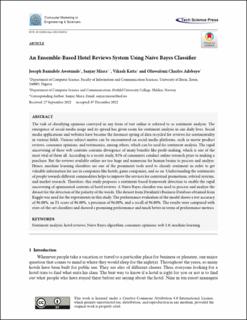| dc.contributor.author | Awotunde, Joseph Bamidele | |
| dc.contributor.author | Misra, Sanjay | |
| dc.contributor.author | Katta, Vikash | |
| dc.contributor.author | Adebayo, Oluwafemi Charles | |
| dc.date.accessioned | 2024-01-11T12:11:26Z | |
| dc.date.available | 2024-01-11T12:11:26Z | |
| dc.date.created | 2023-02-03T13:34:50Z | |
| dc.date.issued | 2023 | |
| dc.identifier.citation | CMES-Computer Modeling in Engineering & Sciences. 2023, 137 (1), 131-154. | en_US |
| dc.identifier.issn | 1526-1492 | |
| dc.identifier.uri | https://hdl.handle.net/11250/3111092 | |
| dc.description.abstract | The task of classifying opinions conveyed in any form of text online is referred to as sentiment analysis. The emergence of social media usage and its spread has given room for sentiment analysis in our daily lives. Social media applications and websites have become the foremost spring of data recycled for reviews for sentimentality in various fields. Various subject matter can be encountered on social media platforms, such as movie product reviews, consumer opinions, and testimonies, among others, which can be used for sentiment analysis. The rapid uncovering of these web contents contains divergence of many benefits like profit-making, which is one of the most vital of them all. According to a recent study, 81% of consumers conduct online research prior to making a purchase. But the reviews available online are too huge and numerous for human brains to process and analyze. Hence, machine learning classifiers are one of the prominent tools used to classify sentiment in order to get valuable information for use in companies like hotels, game companies, and so on. Understanding the sentiments of people towards different commodities helps to improve the services for contextual promotions, referral systems, and market research. Therefore, this study proposes a sentiment-based framework detection to enable the rapid uncovering of opinionated contents of hotel reviews. A Naive Bayes classifier was used to process and analyze the dataset for the detection of the polarity of the words. The dataset from Datafiniti’s Business Database obtained from Kaggle was used for the experiments in this study. The performance evaluation of the model shows a test accuracy of 96.08%, an F1-score of 96.00%, a precision of 96.00%, and a recall of 96.00%. The results were compared with state-of-the-art classifiers and showed a promising performance and much better in terms of performance metrics. | en_US |
| dc.language.iso | eng | en_US |
| dc.publisher | Tech Science Press | en_US |
| dc.rights | Navngivelse 4.0 Internasjonal | * |
| dc.rights.uri | http://creativecommons.org/licenses/by/4.0/deed.no | * |
| dc.subject | sentiment analysis | en_US |
| dc.subject | hotel reviews | en_US |
| dc.subject | Naive Bayes algorithm | en_US |
| dc.subject | consumer opinions | en_US |
| dc.subject | web 2.0 | en_US |
| dc.subject | machine learning | en_US |
| dc.title | An Ensemble-Based Hotel Reviews System Using Naive Bayes Classifier | en_US |
| dc.type | Peer reviewed | en_US |
| dc.type | Journal article | en_US |
| dc.description.version | publishedVersion | en_US |
| dc.subject.nsi | VDP::Teknologi: 500 | en_US |
| dc.source.pagenumber | 131-154 | en_US |
| dc.source.volume | 137 | en_US |
| dc.source.journal | CMES-Computer Modeling in Engineering & Sciences | en_US |
| dc.source.issue | 1 | en_US |
| dc.identifier.doi | 10.32604/cmes.2023.026812 | |
| dc.identifier.cristin | 2122804 | |
| cristin.ispublished | true | |
| cristin.fulltext | original | |
| cristin.qualitycode | 1 | |

